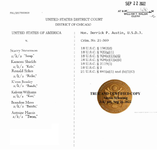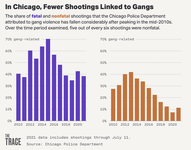Takin Ova The Bity'
YIC (Youngest in Charge)
FreeBand’ is a clique that came up out the Lowend’, started by a few young dudes from the block. Most of them range from about 15 to 23 years old. Two of the better-known members are Tamajae_Cook (17) and Shamek_Graves (17). They go by FreeBand’ ’cause they made a name for themselves all through the South Side of Chicago. The crew been tied to multiple bodies and known hits across Illinois, including the killings of Ahmir_Malik, Niram_Gamble, and a few other targets.
These two been active for a minute — young but wild. They stay gettin’ into trouble, in and out the system, always catching cases. Reckless but motivated, just tryna make it out the trenches of Chicago by any means.
Members of FreeBand’ gon’ do whatever it takes to run up money in the hood and prove they really like that. They money-hungry, always on some hustle — whether it’s hittin’ licks, scamming, or movin’ product.
Nowadays, the clique been linked to attempted murders, shootings, robberies, drug trafficking, and burglaries. They move careful about who they trust or do business with — loyalty comes first, it’s gang before anything. Most of the members are hot-headed and don’t listen to nobody.
They don’t really got no guidance either — most of their OGs locked up doing time for heavy charges like armed robberies, shootings, drug cases, and money moves that went wrong.
At the end of the day, YIC mostly made up of young, hungry kids from 15 to 23 who’ll do whatever for a bag — robbin’, scamming, pushing drugs, even flipping fake shoes or jewelry. Every day they on a mission to get it by any means necessary.
The Indictment'

In the heart of Chicago’s South Side, FreeBand’ had long been a heavy presence — a name that rang out across the bity. Multiple individuals in Englewood and the Lowend’ repped the alias FREEBAND, making it one of the more feared cliques in the area. Their reach stretched beyond turf control — they were knee-deep in drug trafficking, armed robberies, and violent hits that kept their reputation stamped in the streets.
Things took a turn when a string of high-profile shootings brought major heat from the feds. The attacks, known for how bold and back-to-back they were, showed that FreeBand’ wasn’t just on small-time street business anymore — they were moving with a more organized structure, operating like a unit with real hierarchy behind it.
Federal agents teamed up with local law enforcement to launch a deep investigation. Wiretaps, undercover stings, and heavy surveillance surrounded the crew for months. The case cracked wide open when a former insider — once close to the clique’s leadership — flipped and started giving up vital info. His statements exposed how FreeBand’ had been moving guns from out-of-state connects, pushing drugs across the South Side, and organizing coordinated shootings to keep rivals in check and their name feared in the streets.

The investigation uncovered a tight network of individuals who played major roles in the supply and distribution of firearms. These weapons were often used in retaliation hits and intimidation tactics to keep control over the community. FreeBand’s influence stretched far beyond Englewood, linking up with other neighborhoods across the South Side, which only expanded their criminal reach.
As the evidence stacked up, federal prosecutors built a heavy indictment that hit hard. The charges included conspiracy to distribute narcotics, illegal firearm trafficking and possession, racketeering, and multiple counts of attempted murder. Several key figures were named in the paperwork — including the alleged leader Stacey “Scrap” Stevenson, along with close associates Kamoni “Kelo” Shields, Ronald “Rello” Sykes, K’eon “Bands” Beasley, Kaleem “Kso” Williams, Brandon “Bando” Moss, and Antoine “Twon” Hariss.
In a coordinated citywide sweep, law enforcement carried out multiple raids targeting FreeBand’ strongholds. The takedown led to the arrests of numerous members and affiliates. Among the evidence recovered were several high-caliber firearms, large amounts of narcotics, and detailed documents outlining the gang’s operations and hierarchy.
The courtroom battles that followed were nothing short of intense. Defense attorneys pushed the argument that much of the evidence was circumstantial, claiming their clients were being targeted due to reputation and association. But the prosecution came prepared — presenting a solid case built on wiretaps, surveillance footage, and firsthand testimonies from former FreeBand’ members who had flipped and turned state’s witnesses.
In the end, the jury handed down guilty verdicts on multiple charges. Sentences ranged from several years to decades in federal custody, depending on each member’s role in the organization. The convictions marked a major win for law enforcement and stood as a clear warning to other crews operating within Chicago.
Still, while the indictment struck a major blow to FreeBand’ and slowed their movement, it also exposed how deep-rooted organized crime runs in the city. The case became a reminder of the ongoing battle to keep communities safe — proving that it takes cooperation, intelligence work, and relentless effort to truly break down the cycle of violence and control that grips the streets.
Modern Day
FreeBand’ remains a known clique operating on Chicago’s South Side, evolving from basic street-level hustles to a more complex criminal setup that blends both digital and physical operations. What once started as corner work and street sales has now shifted toward cyber-based hustles that target vulnerable individuals and communities.
(File large): https://r2.fivemanage.com/noK16hKaOKcrZDzrcwOaP/menyoo.png
In recent years, FreeBand’ members have increasingly turned to online scams — including phishing schemes, fake websites, social media impersonations, and credit card fraud — all aimed at stealing personal information from unsuspecting victims. By posing as banks, employers, or delivery services, they manipulate people into giving up sensitive data like Social Security numbers and banking credentials.
That stolen information is then used to drain accounts, open fake credit lines, or flipped for profit on the dark web. The shift to digital hustling has especially attracted younger members, who see online scamming as a low-risk, high-reward alternative to the old street grind.
This information is then used to drain accounts, open fraudulent credit lines, or sold on the dark web. The anonymity of digital crime appeals to younger members, who view it as a low-risk, high-reward alternative to traditional street hustles.

While the group have digital activities are concerning, their involvement in the narcotics trade remains a significant threat. Engaging in the distribution of fentanyl-laced heroin and other drugs, they contribute to Chicago's ongoing substance abuse crisis. The proliferation of synthetic opioids like fentanyl has led to an increase in overdoses and emergency hospitalizations, particularly among youth and low-income communities.
The aggressive marketing of these substances normalizes drug use and addiction, deepening the cycle of trauma and instability in affected neighborhoods. The glorification of scamming and drug dealing on social media and in music has shifted cultural norms, with many teens idolizing the flashy lifestyle associated with these activities. This trend not only perpetuates the cycle of crime but also exacerbates public health issues. The normalization of drug use and the glamorization of illegal activities hinder efforts to address the root causes of addiction and crime in Chicago.
Freeband have been evolving in the nature of criminal enterprises in the digital age. Their ability to exploit both the internet and traditional drug markets underscores the need for comprehensive strategies that address both cybercrime and narcotics trafficking. Community education, enhanced law enforcement capabilities, and public health initiatives are essential in combating the multifaceted threats posed by groups like FreeBand'.
YIC (Youngest in Charge)
FreeBand’ is a clique that came up out the Lowend’, started by a few young dudes from the block. Most of them range from about 15 to 23 years old. Two of the better-known members are Tamajae_Cook (17) and Shamek_Graves (17). They go by FreeBand’ ’cause they made a name for themselves all through the South Side of Chicago. The crew been tied to multiple bodies and known hits across Illinois, including the killings of Ahmir_Malik, Niram_Gamble, and a few other targets.
These two been active for a minute — young but wild. They stay gettin’ into trouble, in and out the system, always catching cases. Reckless but motivated, just tryna make it out the trenches of Chicago by any means.
Members of FreeBand’ gon’ do whatever it takes to run up money in the hood and prove they really like that. They money-hungry, always on some hustle — whether it’s hittin’ licks, scamming, or movin’ product.
Nowadays, the clique been linked to attempted murders, shootings, robberies, drug trafficking, and burglaries. They move careful about who they trust or do business with — loyalty comes first, it’s gang before anything. Most of the members are hot-headed and don’t listen to nobody.
They don’t really got no guidance either — most of their OGs locked up doing time for heavy charges like armed robberies, shootings, drug cases, and money moves that went wrong.
At the end of the day, YIC mostly made up of young, hungry kids from 15 to 23 who’ll do whatever for a bag — robbin’, scamming, pushing drugs, even flipping fake shoes or jewelry. Every day they on a mission to get it by any means necessary.
The Indictment'

In the heart of Chicago’s South Side, FreeBand’ had long been a heavy presence — a name that rang out across the bity. Multiple individuals in Englewood and the Lowend’ repped the alias FREEBAND, making it one of the more feared cliques in the area. Their reach stretched beyond turf control — they were knee-deep in drug trafficking, armed robberies, and violent hits that kept their reputation stamped in the streets.
Things took a turn when a string of high-profile shootings brought major heat from the feds. The attacks, known for how bold and back-to-back they were, showed that FreeBand’ wasn’t just on small-time street business anymore — they were moving with a more organized structure, operating like a unit with real hierarchy behind it.
Federal agents teamed up with local law enforcement to launch a deep investigation. Wiretaps, undercover stings, and heavy surveillance surrounded the crew for months. The case cracked wide open when a former insider — once close to the clique’s leadership — flipped and started giving up vital info. His statements exposed how FreeBand’ had been moving guns from out-of-state connects, pushing drugs across the South Side, and organizing coordinated shootings to keep rivals in check and their name feared in the streets.

The investigation uncovered a tight network of individuals who played major roles in the supply and distribution of firearms. These weapons were often used in retaliation hits and intimidation tactics to keep control over the community. FreeBand’s influence stretched far beyond Englewood, linking up with other neighborhoods across the South Side, which only expanded their criminal reach.
As the evidence stacked up, federal prosecutors built a heavy indictment that hit hard. The charges included conspiracy to distribute narcotics, illegal firearm trafficking and possession, racketeering, and multiple counts of attempted murder. Several key figures were named in the paperwork — including the alleged leader Stacey “Scrap” Stevenson, along with close associates Kamoni “Kelo” Shields, Ronald “Rello” Sykes, K’eon “Bands” Beasley, Kaleem “Kso” Williams, Brandon “Bando” Moss, and Antoine “Twon” Hariss.
In a coordinated citywide sweep, law enforcement carried out multiple raids targeting FreeBand’ strongholds. The takedown led to the arrests of numerous members and affiliates. Among the evidence recovered were several high-caliber firearms, large amounts of narcotics, and detailed documents outlining the gang’s operations and hierarchy.
The courtroom battles that followed were nothing short of intense. Defense attorneys pushed the argument that much of the evidence was circumstantial, claiming their clients were being targeted due to reputation and association. But the prosecution came prepared — presenting a solid case built on wiretaps, surveillance footage, and firsthand testimonies from former FreeBand’ members who had flipped and turned state’s witnesses.
In the end, the jury handed down guilty verdicts on multiple charges. Sentences ranged from several years to decades in federal custody, depending on each member’s role in the organization. The convictions marked a major win for law enforcement and stood as a clear warning to other crews operating within Chicago.
Still, while the indictment struck a major blow to FreeBand’ and slowed their movement, it also exposed how deep-rooted organized crime runs in the city. The case became a reminder of the ongoing battle to keep communities safe — proving that it takes cooperation, intelligence work, and relentless effort to truly break down the cycle of violence and control that grips the streets.
Modern Day
FreeBand’ remains a known clique operating on Chicago’s South Side, evolving from basic street-level hustles to a more complex criminal setup that blends both digital and physical operations. What once started as corner work and street sales has now shifted toward cyber-based hustles that target vulnerable individuals and communities.
(File large): https://r2.fivemanage.com/noK16hKaOKcrZDzrcwOaP/menyoo.png
In recent years, FreeBand’ members have increasingly turned to online scams — including phishing schemes, fake websites, social media impersonations, and credit card fraud — all aimed at stealing personal information from unsuspecting victims. By posing as banks, employers, or delivery services, they manipulate people into giving up sensitive data like Social Security numbers and banking credentials.
That stolen information is then used to drain accounts, open fake credit lines, or flipped for profit on the dark web. The shift to digital hustling has especially attracted younger members, who see online scamming as a low-risk, high-reward alternative to the old street grind.
This information is then used to drain accounts, open fraudulent credit lines, or sold on the dark web. The anonymity of digital crime appeals to younger members, who view it as a low-risk, high-reward alternative to traditional street hustles.

While the group have digital activities are concerning, their involvement in the narcotics trade remains a significant threat. Engaging in the distribution of fentanyl-laced heroin and other drugs, they contribute to Chicago's ongoing substance abuse crisis. The proliferation of synthetic opioids like fentanyl has led to an increase in overdoses and emergency hospitalizations, particularly among youth and low-income communities.
The aggressive marketing of these substances normalizes drug use and addiction, deepening the cycle of trauma and instability in affected neighborhoods. The glorification of scamming and drug dealing on social media and in music has shifted cultural norms, with many teens idolizing the flashy lifestyle associated with these activities. This trend not only perpetuates the cycle of crime but also exacerbates public health issues. The normalization of drug use and the glamorization of illegal activities hinder efforts to address the root causes of addiction and crime in Chicago.
Freeband have been evolving in the nature of criminal enterprises in the digital age. Their ability to exploit both the internet and traditional drug markets underscores the need for comprehensive strategies that address both cybercrime and narcotics trafficking. Community education, enhanced law enforcement capabilities, and public health initiatives are essential in combating the multifaceted threats posed by groups like FreeBand'.
Last edited:
